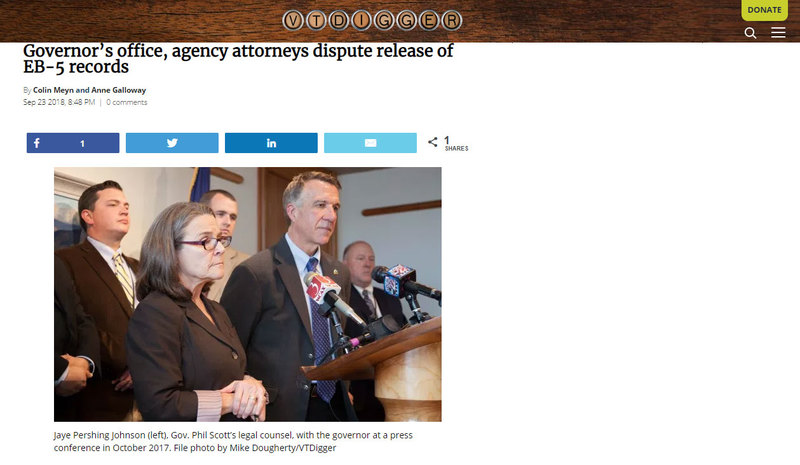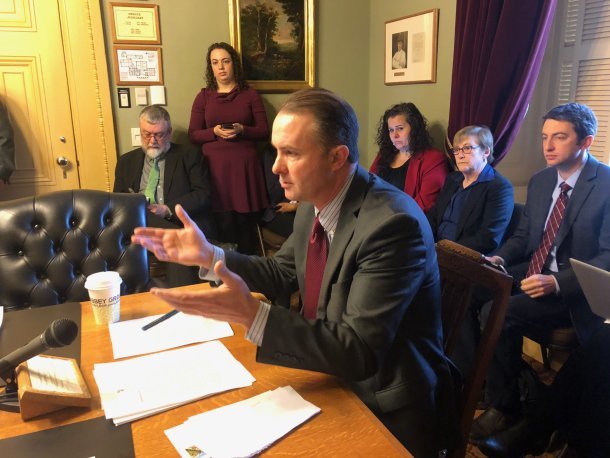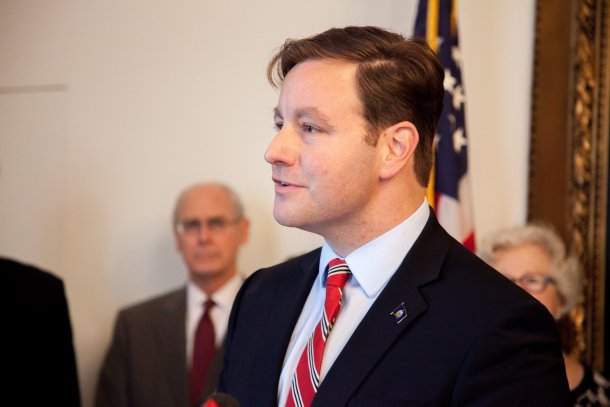Governor’s office, agency attorneys dispute release of EB-5 records
Jaye Pershing Johnson (left), Gov. Phil Scott’s legal counsel, with the governor at a press conference in October 2017.
Emails obtained by VTDigger show internal squabbling within Vermont’s executive branch over the release of state EB-5 reports filed with the federal government. The records would shed insight into what the state was telling federal authorities during an eight-year period in which the developers of Jay Peak resort carried out a monumental fraud in the Northeast Kingdom.
The Vermont EB-5 Regional Center filed annual reports with U.S. Citizenship and Immigration Services (the so-called I-924), and forms for individual projects (the I-924A), from 2008 through 2016. During that time, former Jay Peak owner Ariel Quiros and the ski area’s CEO Bill Stenger misused $200 million in foreign investment monies through the state-run EB-5 program. More than 800 investors were impacted by the fraud. Most have not recouped the $500,000 they each invested in the Jay Peak projects; more than half have not received green cards as promised through the program.
Officials in former Gov. Peter Shumlin’s administration were warned about financial improprieties at Jay Peak in the spring of 2012. That year a former EB-5 chief’s questions about those allegations were rebuffed by superiors. Brent Raymond, the director of the Vermont EB-5 center from 2012 to 2015, said in a sworn deposition last month that he had repeatedly requested audits of Jay Peak and had asked about self-dealing related to a biomedical facility that turned out to be a complete scam. Raymond says he was shut down by administration officials and Alex MacLean, a former aide to Shumlin who was working for Stenger at the time.
VTDigger has for two years been pushing for the release of the 924s and 924As that Vermont’s commerce agency was required to send to the USCIS from the time the EB-5 center opened in 1997 to the present. The requests have been denied, with officials arguing that the documents are relevant to ongoing litigation and therefore exempt from public records laws.
Jaye Pershing Johnson, the general counsel for Gov. Phil Scott, argues that the 924s should be released in an email exchange this month with attorneys from the commerce agency, the Department of Financial Regulation and the Vermont Attorney General’s office.
Johnson points to a central contradiction in the refusal to release documents.
On one hand, agency attorneys, led by the Vermont Attorney General’s office, say the state had no legal duty to vet information coming from Stenger and Quiros and the developers bear all of the responsibility for any misrepresentations. On the other, the lawyers say if the state releases documents that show the commerce agency, the regional center and the Department of Financial Regulation failed in that duty, the state could be legally liable for the damage done to investors.
“We are saying IF there are misrepresentations, and I still do not have a clear idea about whether that is the case, they were never our representations, but rather the representations of the developers,” Johnson writes. “lf they were not our representations, the forms are not relevant to litigation.”
The Scott administration, Vermont Attorney General TJ Donovan and the Agency of Commerce and Community Development have withheld more than 1.5 million pages of documents related to the fraud at Jay Peak. VTDigger requested specific communications between commerce agency employees and Jay Peak principals in 2015 and 2016 that have never been fulfilled. The Shumlin administration and the Attorney General’s office at that time blocked access to records pertaining to the state’s communications with the developers and failure to adequately monitor the projects.
TJ Donovan gives testimony on gun legislation to the Senate Judiciary Committee earlier this year as David Scherr, far right, looks on.
There are two lawsuits in play. In 2016, the state sued Quiros and Stenger and has since claimed a relevant litigation exemption that has enabled officials to continue to stymie requests for information. Stenger and Quiros settled with the state earlier this year. In 2017, a group of investors sued the state for breach of fiduciary duty, among other allegations. That lawsuit was dismissed in the spring and has been appealed to the Vermont Supreme Court.
The position of the Vermont Attorney General’s Office is represented most clearly in the email exchange by Gavin Boyles, general counsel at the Department of Financial Regulation. The thrust of Boyle’s reasoning is that release of the 924s and 924As would weaken the state’s ability to use the exemption to shield other documents related to state’s oversight of Jay Peak.
“There is nothing in them that is particularly new or damaging. As you know some of them are already public in redacted form,” he writes on Sept. 12. “I would still recommend that we not release the 924s, however. The line we’ve drawn, per our recent phone call, is that we’ll release DFR documents because DFR is no longer a party to litigation. These are not DFR documents and there’s no principled line to be drawn between them and any of the other multitudes of non-damaging non-DFR documents that are relevant to the litigation.”
“I just spoke with Bill Griffin and he agrees,” Boyles adds.
Griffin is representing state officials in cases related to the Jay Peak fraud. He is also the attorney general’s point person on public records. Griffin did not respond to a call seeking comment Friday. He is copied on many of the emails related to the 924s, and appears briefly, agreeing with the assessment that the records are exempt. “The litigation is ongoing,” he writes.
Johnson argues that reasoning is faulty. “The reason we have stated for withholding is that they are relevant to litigation as it relates to claims of misrepresentation by the State,” Johnson writes. “However, we also say, in our USCIS filings (and this is supported in the Brent Raymond testimony) (i) they are not our representations — we accepted them wholesale from the developers; and (ii) we had no legal or other duty to look behind the numbers,” Johnson says in an email on Sept. 12.
Johnson says the AG’s arguments are also undercut by the prior public release of some of the 924s and 924As. A 2016 form was previously provided to VTDigger after the news organization sued in 2017 and have also been shared with USCIS, a third party to the lawsuit. In addition, USCIS has posted 924A forms from 2015 on its website. She says that because some of the forms have already been made public, releasing all of them would not set a precedent for the hundreds of thousands of other pages of documents that remain under wraps.
Ariel Quiros (left), Gov. Peter Shumlin, Bill Kelly and Bill Stenger at a ribbon cutting for Jay Peak’s Stateside Hotel in December 2013.
“I disagree there is no bright line for releasing — the documents can be obtained from a federal agency and many of them are already public. I no longer see a bright line for withholding and again express the desire of this Office to release,” she writes.
In another email sent on Sept. 20 to Dale Azaria, general counsel at the Department of Housing and Community Development, Johnson said the governor’s office has “consistently argued in favor of releasing these documents.”
In an email as far back as Dec. 13, 2017, Johnson suggests a desire to change the mind of Griffin, the chief assistant attorney general. “I know his view was conservative, but was willing to think differently about it if the material was already in the public domain,” she writes. On Aug. 13, 2018, Johnson writes again to Azaria, saying “I just wanted to take another run at the potential for disclosure.”
Charity Clark, chief of staff for Attorney General TJ Donovan, said that neither Griffin nor Donovan were available for an interview Friday. “The bottom line for us is we advised our client,” Clark said of DFR’s decision to deny a request for the 924s. “I think state government often has to balance competing interests and public records is always an area where there’s balancing.”
Asked if Griffin, as a public official, also took the public’s right to information into account when carrying out his duties, she said she did not want to speak for him. “I think of Bill as a lawyer’s lawyer,” she said.
Before Johnson sent the email to Boyles making her case for releasing the 924s, she suggested to other administration officials that the governor’s office might unilaterally release the records.
“If there is an argument for releasing we could take another run at it with the AGO, or just release,” she wrote to Jason Gibbs, the governor’s chief of staff, and Tayt Brooks, the governor’s director of affordability and economic growth initiatives.
Johnson said in an interview Friday that the governor’s office was still considering a unilateral release of the documents, but that the decision was not taken lightly.
“The worst that would happen is we completely undermine the AG’s case, that the documents would undermine the AG’s case, or weaken the AG’s case,” she said. “They have a very strong case, they believe, and they are pursuing it with a very disciplined strategy, so that’s what we want to be careful for. At the end of the day, if there is a liability to the state, that impacts taxpayers.”
Johnson said she believed the attorney general’s office was on sound legal footing in claiming that the 924s were exempt from public records laws, but felt that the public interest in seeing the documents outweighed the legal considerations.
The spotlight was shifted back on the 924 forms in July, when the USCIS closed Vermont’s state-run EB-5 center because officials failed to stop the largest fraud in the history of the foreign investment program. The USCIS also said that the commerce agency, which was overseeing the center at the time, made material misrepresentations in its report to the feds.
The question of whether state officials knowingly submitted those misrepresentations, or unwittingly passed along falsities concocted by Stenger and Quiros, gets at the heart of two cases brought against the state by attorney Russell Barr, who is representing a handful of the investors who each lost hundreds of thousands of dollars and the chance to move permanently to America. Barr is arguing that state officials had a hand in the scheme.
Mike Pieciak, commissioner of the Department of Financial Regulation.
Michael Pieciak, commissioner of the Department of Financial Regulation, spent two years investigating the fraud at Jay Peak, focusing mostly on the activity of Stenger and Quiros, and said he did not see anything that suggested malfeasance by state officials. He said there was nothing damaging in the 924 forms, but that the attorney general was pursuing a more general strategy of shielding documents.
“The forms have to be taken in the larger context of the millions of pages of documents we have and in the context of litigation. There’s nothing particularly insightful in those documents,” Pieciak said. Although the state does not believe that Barr’s claims have merit, he added, it still has to treat them seriously.
“The state never intentionally misled, that’s our point and that’s our argument, obviously we were defrauded, as was the USCIS,” he said. Asked how the state was defrauded, when only the foreign investors lost money, Pieciak, who earns more than $120,972 a year, said he had personally lost two years of his life investigating the case, and the state had spent hundreds of thousands of dollars on investigations and litigation.
Asked why the state would not release the annual EB-5 reports if they in no way undermined the state’s case, and had already been released in part by a federal agency, Pieciak said the decision was part of a strategy to limit access to information that might give plaintiffs suing the government more ammunition in court.
“It really has less to do with the specific documents, we are balancing the relevant litigation exemption and not doing any unintentional damage to any of the individual litigants or agencies while balancing against the strong public interest in releasing the documents,” he said.
For the time being, his department is following the advice of the attorney general’s office.
“Again in other contexts with other agencies, USCIS making them public, that doesn’t mean that the legal analysis doesn’t hold that any documents related to the litigation need to go through the legal process of discovery,” he said. Pieciak said he appreciated that withholding a type of document that had already been made public by both the state and federal government might be “confusing” to some.
“But I think it’s clear the Vermont government is in litigation and the federal government is not. When the state of Vermont is being affirmatively litigated against, then we have to follow legal advice,” Pieciak said.
Ultimately, he said, it is up to the department whether to release records.
“We can disregard his legal advice,” he said of Griffin. “I think his analysis is sound, but its up to us to determine to what point we say the public interest outweighs the legal concerns.”
Mentions
- Vermont Agency of Commerce and Community Development RC
- U.S. Citizenship and Immigration Services
- Vermont EB5 Regional Center
- Ariel Quiros
- Bill Stenger
- Peter Shumlin
- Brent Raymond
- Jay Peak Resort - State Side Hotel and Baselodge
Litigation Cases
- MICHAEL I. GOLDBERG vs The AM Wealth Management Group of Raymond James & Ariel Quiros & Joel Burstein
- JAMES B. SHAW, JOHANNES EIJMBERTS, and LORNE MORRIS Individually and On Behalf of All Others Similarly Situated, vs The AM Wealth Management Group of Raymond James & Bill Stenger & Joel Burstein & Ariel Quiros
- ALEXANDRE DACCACHE, on behalf of himself and all others similarly situated vs Ariel Quiros & Bill Stenger & The AM Wealth Management Group of Raymond James & Joel Burstein
- State of Vermont vs Bill Stenger & Ariel Quiros
- UNITED STATES SECURITIES AND EXCHANGE COMMISSION vs Ariel Quiros & Bill Stenger
States
- Vermont
Securities Disclaimer
This website is for informational purposes only and does not constitute an offer or solicitation to sell shares or securities. Any such offer or solicitation will be made only by means of an investment's confidential Offering Memorandum and in accordance with the terms of all applicable securities and other laws. This website does not constitute or form part of, and should not be construed as, any offer for sale or subscription of, or any invitation to offer to buy or subscribe for, any securities, nor should it or any part of it form the basis of, or be relied on in any connection with, any contract or commitment whatsoever. EB5Projects.com LLC and its affiliates expressly disclaim any and all responsibility for any direct or consequential loss or damage of any kind whatsoever arising directly or indirectly from: (i) reliance on any information contained in the website, (ii) any error, omission or inaccuracy in any such information or (iii) any action resulting therefrom.







